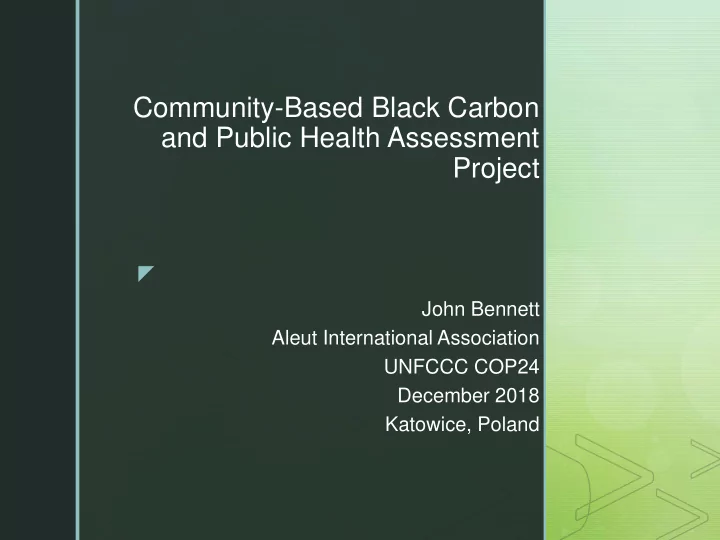

Community-Based Black Carbon and Public Health Assessment Project z John Bennett Aleut International Association UNFCCC COP24 December 2018 Katowice, Poland
z Origins Based in Anchorage, Alaska, Aleut International represents Aleut communities in Alaska and Russia and is one of the Arctic Council’s six Permanent Participant organizations. This project resulted from the belief that there is a need to increase awareness of the risks black carbon poses to the environment and public health among indigenous communities in the Far North.
z Our approach Partner with Arctic indigenous communities. Monitor black carbon concentrations. Characterize local public health risks Build awareness Identify and promote mitigation options. Help strengthen local capacities to identify and prevent BC pollution. Increase national and regional support
z Project development Developed with Alaska Native Science Commission in framework of Arctic Alliance. Approved by Arctic Council’s ACAP Working Group and Senior Arctic Officials. Refined through support by Swedish EPA 2017: Desk Study phase funded by Arctic Council’s Project Support Instrument/Nordic Environmental Finance Corporation (NEFCO) December 2018: Desk Study concluding Preparing report and application for Full Feasibility Study – hope to begin in 2019
z Partners Alaska Native Science Commission (Anchorage) University of Alaska-Anchorage University of Alaska-Fairbanks All-Russian Research Institute for Nature Protection (Moscow) SRI Atmosfera (St. Petersburg) North-West Public Health Research Institute (St. Petersburg)
z Desk Study Outputs Sampled BC monitoring in Circle, Alaska Methodologies for gathering emissions and public health data Gathering retrospective public health data and seeking legal permissions Consulting tribal authorities and other key stakeholders Preparing draft community health survey Identifying synergies with Arctic Council/relevant projects
z Target communities Identified 5 indigenous communities for full Feasibility Study 2 in Alaska, US: Nome (pop. 3,600, shipping) Fort Yukon (pop. 600, forest burning) 3 in Nenets Autonomous Okrug, Russia: Nes (pop. 1,368, coal/wood) Nel’min -Nos (pop. 817, diesel/wood) Krasnoye (pop. 1,800, gas)
z
z
z
z Full Feasibility Study outputs Community black carbon assessments with Monitoring results Public health risk characterizations Mitigation options Draft community black carbon survey self- assessment tool. Information and briefings for communities, decision makers, donors. Replicable community-based black carbon and public health assessment approach.
z Thank you very much!
Recommend
More recommend